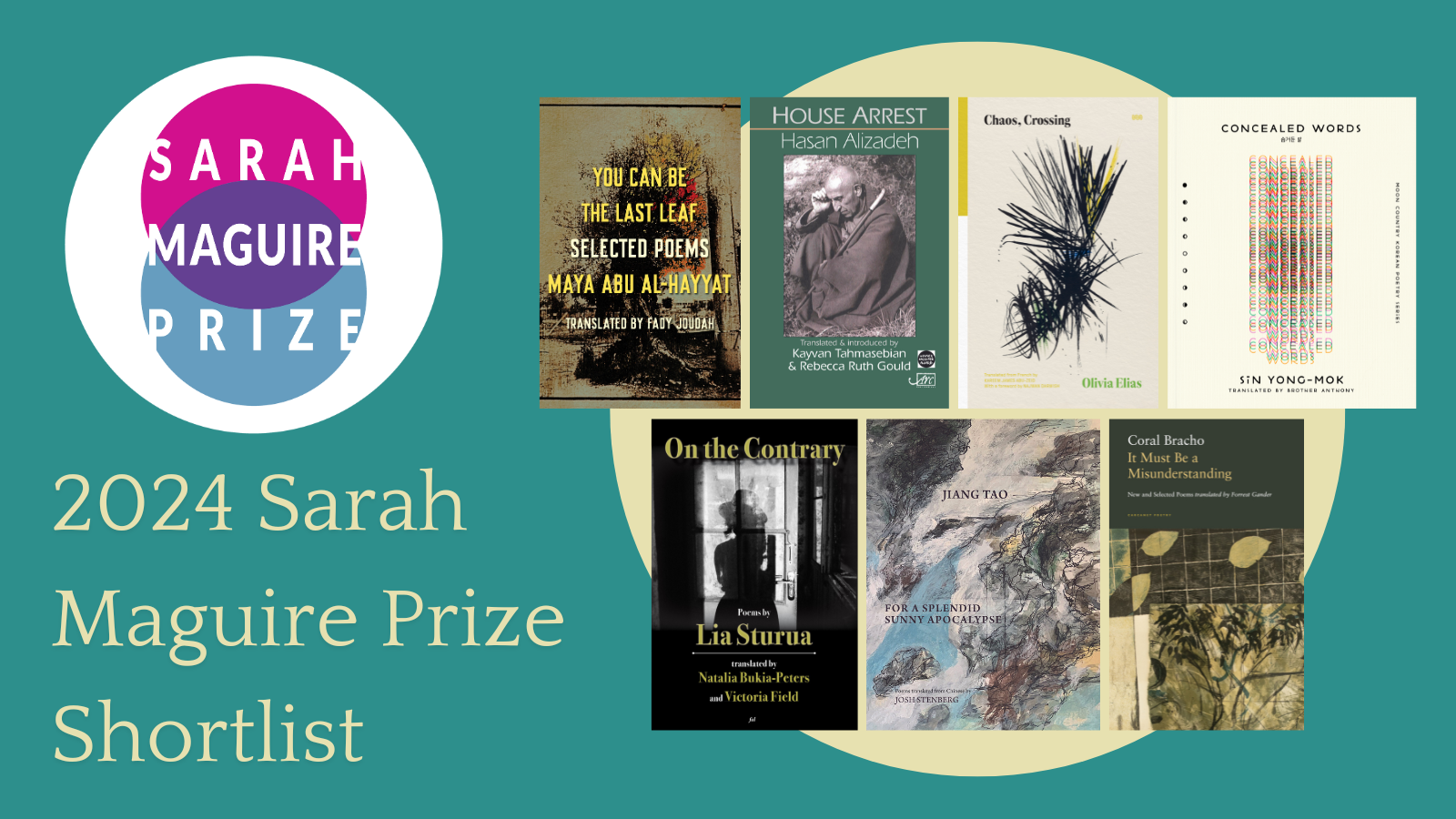We are proud to present the 2024 shortlist for the Sarah Maguire Prize for poetry in translation. Ellen McAteer, Publishing Manager, says “We are delighted with the judges’ choices, which show a full range of voices from across the globe, including poets from backgrounds as varied as Palestine, Georgia, Mexico, South Korea, Iran, Lebanon and China.” The judges this year were Ian McMillan, English poet and presenter on The Verb on BBC Radio 3, Eiléan Ní Chuilleanáin, Irish poet, academic, and translator, and Ghareeb Iskander, a prizewinning Iraqi poet and translator.
“I’m honoured to be a judge of the Sarah Maguire Prize, proudly keeping her name alive and giving a space to those who, like she did, wrestle with language and meaning every day of their lives.” Ian McMillan
The Sarah Maguire Prize for Poetry in Translation is an international biennial award for the best book of poetry in English translation by a living poet from beyond Europe. The winning poet and their translator, or translators, will split an award of £3000 between them. The shortlist includes:
You Can Be the Last Leaf by Maya Abu Al-Hayyat, translated from Arabic by Fady Joudah
Translated from the Arabic and introduced by Fady Joudah, You Can Be the Last Leaf draws on two decades of work to present the transcendent and timely US debut of Palestinian poet Maya Abu Al-Hayyat. Art. Garlic. Taxis. Sleepy soldiers at checkpoints. The smell of trash on a winter street, before “our wild rosebush, neglected / by the gate, / blooms.” Lovers who don’t return, the possibility that you yourself might not return. Making beds. Cleaning up vomit. Reading recipes. In You Can Be the Last Leaf, these are the ordinary and profound—sometimes tragic, sometimes dreamy, sometimes almost frivolous—moments of life under Israeli colonial rule.
Chaos, Crossing by Olivia Elias, translated from French by Kareem James Abu-Zeid
In her English-language debut, acclaimed French-language poet of the Palestinian diaspora Olivia Elias probes deeply into the upheavals of the twentieth and twenty-first centuries. Chaos, Crossing—translated by award-winning translator Kareem James Abu-Zeid—is a powerful chronicle of uprootedness, of times marked by inequality, injustice, and disconnection. These poems seek the calm at the center of the storm, the still point amidst the chaos.
On The Contrary by Lia Sturua, translated from Georgian by Natalia Bukia-Peters and Victoria Field
This is the first collection in English from this remarkable Georgian poet. Born in 1939, Lia has lived through tumultuous times, and has always been an innovative, original and inspirational poet, drawing on imagery of music, painting, architecture and the body in her dreamlike work.
It Must Be a Misunderstanding by Coral Bracho, translated from Spanish by Forrest Gander
Mexican poet, teacher and translator Coral Bracho was born in Mexico City in 1951. She has published several books, two in English thanks to the brilliant poet-translator Forrest Gander, who has put this composite volume together, the first time Bracho has been extensively published in the UK. An extensive selection from Bracho’s earlier work, which ‘altered the landscape of Mexican poetry’ (World Literature Today), is accompanied by the entirety of her new book, of which Gander writes: ‘Although composed of individual poems, It Must Be a Misunderstanding is really a deeply affecting book-length work whose force builds as the poems cycle through their sequences. The “plot” follows a general trajectory—from early to late Alzheimer’s—with non-judgmental affection and compassionate watchfulness.
Concealed Words by Sin Yong-mok, translated from Korean by Brother Anthony of Taizé
A debut English-language collection of hopeful and carefully attentive poems by one of South Korea’s most lauded young poets, this collection offers a selection of poems from Sin Yong-mok’s earlier collections, intended to serve as an illustration of his evolution as a poet, alongside a complete translation of the poems from his fourth collection, When Someone Called Someone, I Looked Back. Beautifully translated by Brother Anthony of Taizé with close attention to the sonorous aspects of Sin’s lines, this collection also captures the larger themes within Shin’s work and his attention to the spirit of community and peaceful coexistence with others. These are poems with a powerful belief in humanity and the beauty of the smallest hopes.
House Arrest by Hazan Alizadeh, translated from Persian by Kayvan Tahmasebian and Rebecca Ruth Gould
Notwithstanding his spare output, with only two volumes of poetry – Diary of House Arrest (Ruznama-ye tab‘id, 2003) and Blue Bicycle (Ducharkha-yi ābī, 2015) – to his name, Iranian poet Hasan Alizadeh has left a poetic signature on modern Persian poetry, distinguished by lyricism and colloquialism. In Alizadeh’s poems, a labyrinthine memory, structured by the intricate architecture of old Iranian bazaars and mosques, continually revises itself in spontaneous narrations of love and death. With an informative introduction placing the poet’s work in context, this evocative translation brings Alizadeh’s two collections into English for the first time.
For a Splendid Sunny Apocalypse by Jiang Tao, translated from Chinese by Josh Stenberg
In these melancholy and self-mocking poems — populated with youths and elders, cellphones and televisions — Jiang Tao presents and dissects a discontent with the state of the world. He employs his profound wit and poetic mastery to explore the passage of time, rural-urban migration, change and impermanence, and the difficulties of human communication and connection. Jiang Tao’s verse is, as translator Josh Stenberg has written, “a quintessential expression of urban malaise in contemporary China.” This is his first book to appear in English and is presented bilingually on facing pages.

